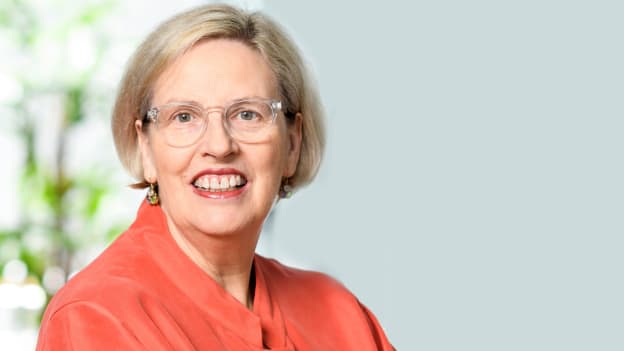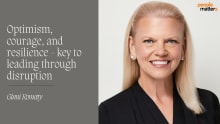COVID-19 is not just a health crisis, but also a social and economic crisis: World Bank’s Annette Dixon

Annette Dixon is the World Bank Group’s Vice President for Human Resources, responsible for providing strategic leadership to the institution on talent development and overseeing all HR policies, programs, services to support the Bank Group’s global workforce.
Prior to this appointment, Annette was the World Bank’s Vice President, Human Development, overseeing the Global Practices for education; health, nutrition, and population; gender; and social protection and jobs, and the Gender Group. She led the Bank’s work on Human Capital and oversaw the COVID-19 emergency response, under which the Bank delivered $20 billion in human development investments.
Before joining the region, Annette was Director, Strategic Planning in the Budget, Performance Review and Strategic Planning Vice Presidency and Country Director to Central Asia, then Southeast Asia. She joined the Bank in 1999 and worked as Sector Director to Human Development in the ECA region.
Annette is a long-standing champion on gender issues. In South Asia, she set a target to deliver 100 percent gender-informed projects and interventions, going beyond the global corporate requirements. Under her leadership, the regional priority for South Asia was to support countries to improve Women’s Labor Force Participation.
Prior to joining the World Bank, Annette Dixon worked for the Government of New Zealand as Chief Executive of the Ministry of Youth Affairs. She also served as General Manager, Sector Policy; Deputy Director-General in the Ministry of Health; Director of Health Policy, Department of the Prime Minister; and Manager Policy Division, Ministry of Women’s Affairs.
Here are the excerpts from the interview.
You have been with the World Bank for over two decades now. What are some of the special moments for you as a global HR leader in terms of impact and achievements?
I have been fortunate to see the impact of our work from different perspectives as a Country Director, Regional Vice President for South Asia, and most recently as Vice President for Human Development, leading our work to support country investments in social protection, health and education. That, in itself, has been a most rewarding and fulfilling experience.
One of the achievements that I am proud of has been the work that we have done as an institution to enable countries make the right investments in improving social safety nets, health and education, as part of the human capital project. In 2018, we launched the global Human Capital Index as a way to quantify the contribution of health and education outcomes to national productivity. This index now covers 103 countries and is an important contribution to building a world in which all children reach their full potential—growing up well-nourished and ready to learn, attaining real learning in the classroom, and entering the job market as healthy, skilled, and productive adults.
Also Read...
- An interview with Dr. Tomas Chamorro-Premuzic
- An interview with Google’s Chief Innovation EvangelistDr. Frederik G. Pferdt
- Intel's CPO on reimagining the way we work
And now, in my current role as HR VP, I get to focus on our own internal human capital at the World Bank. I see my role as helping our talented staff be the best that they can be. The other part of the job is about attracting the best talent to come and work for us.
What's your take on how global leaders and governments responded to the COVID-19 crisis? Do you see any gap? Will COVID-19 change the world permanently?
COVID-19 is the biggest challenge of our generation. There is no doubt that global leaders are taking this pandemic seriously, given the impact on people and national economies. Many countries are facing multiple vulnerabilities; this is not just a health crisis, but it’s also a social and economic crisis. Many millions of people are out of jobs and kids out of school. And government budgets are strained and country debt levels are increasing.
Our response as the World Bank Group has focused on saving lives, protecting the poor and vulnerable, ensuring sustainable business growth, and rebuilding in better ways. We are delivering emergency support to over 100 countries so far and have made available up to $160 billion in financing over a 15-month period ending June 2021 to help countries strengthen their health systems and support their poorest people during the crisis. And recently, we announced a fast-track facility that will provide up to $12 billion in financing to developing countries for the purchase and distribution of COVID-19 vaccines.
The world post-COVID-19 will look very different in many ways.
In the short-term, I think that the response to COVID-19 needs to be intensified: both in terms of the health emergency and efforts to find effective support systems and recovery plans.
There is a greater need for speedy and decisive policy support, global coordination, and policy transparency. We need to help countries rebuild in better ways.
The crisis, which has unleashed a global health emergency and an unprecedented economic crisis, has brought a massive drop in labor income for workers around the world. How can we come out of this and how long will the recovery take?
The current economic downturn resulting from COVID-19 is broader and deeper than previous recessions, and has hit the poor, and especially women and children, the hardest. We estimate that the global economy will shrink 5.2 percent this year, representing the deepest recession since the Second World War. The pandemic could push up to 150 million more people into extreme poverty by 2021.
It is premature to predict how long the recovery will take and it won’t be the same for every country. Most countries will need strong economic growth and job creation, which require a healthy and vibrant private sector. To this end, the World Bank Group’s private sector arm, the International Finance Corporation (IFC), is implementing an $8 billion fast-track financing facility to keep liquidity flowing to businesses during the crisis, especially to micro, small, and medium enterprises, which are a major source of employment in developing countries.
Vaccines will also play an important role. We have to make sure that the poorest countries do not have to wait years to access vaccines. We are working closely with UN agencies, other MDBs, bilaterals, and the global health funds - CEPI and GAVI, as well as the countries themselves to make sure they have access to financing and technical support for diagnostics, therapeutics, and vaccines, as well as the logistics support to be able to deliver them.
Do you think the crisis also provides an opportunity to build back stronger systems for people and economies? Where do you see the future of work five years down the line?
Yes, absolutely. We must prioritise assistance to the most vulnerable through strengthening schemes such as cash transfers and extending credit to small and medium enterprises. At the same time, it is critical that as countries work to recover from this pandemic, they do so in ways that will strengthen their systems and ensure a more robust, sustainable and resilient future. The pandemic has underscored the deep connections between economic systems, human health, and global well-being.
Also, we must ensure that the lessons learned from this pandemic are put to use for future crises. This means putting knowledge and data at the center of our operations; to help governments make vital decisions informed by the best and latest research. In Africa, for example, this knowledge transfer has been critical. The World Bank Group was able to help many countries fight COVID-19 by building on lessons and systems put in place during the Ebola crisis. We were able to leverage regional networks developed with WBG support after Ebola to help countries quickly scale up early detection, testing, and tracing.
How do you see the impact of the pandemic on the women workforce globally? Do you think diversity and inclusion are critical for recovery and business resilience?
The COVID-19 crisis is exposing – and exacerbating – inequalities throughout the world. An estimated 1 in 3 people are excluded, or at risk of being excluded, from economic opportunities, including women, ethnic minorities and indigenous peoples, persons with disabilities, and sexual and gender minorities.
With 740 million women globally in informal employment and a majority employed in services, women are particularly hard hit by the crisis. Women often face lost opportunities and reduced financial independence due to school closures and increased unpaid family care responsibilities; and heightened risk of disease exposure due to their role as caregivers and health workers.
As part of our response to the pandemic, we are ramping up our investment in cash transfers by $10 billion over the next 15 months. For example, in Pakistan, $25 million will provide emergency cash transfers for up to four million people under the national safety net. The assistance will help the poorest buy food and prevent them from having to sell vital assets. An additional $12 million will finance delivery of basic food supplies to 40,000 people who are quarantined or have limited mobility.
In Tajikistan, the existing Targeted Social Assistance system will provide time-bound cash transfers to food-insecure households with children under the age of two, to mitigate the effects of increased food prices and protect children’s nutrition.
As experts say, technology will be at the heart of every workplace as we return to office post the COVID-19 crisis. What should be at the core of digital innovations that businesses will look up to move forward in the long term?
Technology can play a critical role, including in the fight against the pandemic. In many countries, we see how digital technologies are saving lives by enabling smarter approaches to social distancing and contact tracing. At the same time, we see how technology is enabling e-commerce and access to financial services through mobile payments, as well as bringing remote education to many millions of children. The pandemic is definitely accelerating the adoption of these digital technologies.
However, a big concern is that far too many people risk being left behind. Only about 35 percent of the population in developing countries have access to the internet.
Leadership is always hard to define but is easy to identify in times of crisis. What type of leadership does the world need today and how do you see the future of leadership?
I think right now this is a time for empathetic and collaborative leadership. Around the world, we can see many examples of countries managing to contain the pandemic, and get their economies back on track. The leaders who are making progress are doing this by communicating and collaborating with all stakeholders so that everybody is aligned around what needs to be done to save lives and help to restore living standards.
What does the World Bank Group's HR landscape look like? As the HR lead, what all initiatives have you taken so far to safeguard your employees and ensure their continued productivity? How has the impact been?
The World Bank Group is a global institution with staff in over 100 countries. Nearly all our 16,000+ staff are working remotely from their homes around the world. All through the pandemic, our primary focus as an HR function has been to help our staff stay safe, while continuing to serve our client countries. We have taken steps to give our staff the support they need to adapt in the face of this pandemic. A big part of this was about addressing issues around work-life balance, mental health and resilience.
With the support of our global health network, we are providing extensive ongoing psychosocial support, online access to health professionals and safety information, and free COVID-19 testing. In the few locations where we have reopened our offices, we have put in place enhanced safety measures including workplace social distancing measures and PPE.
What are your current areas of focus and top challenges? What keeps you up at night? If you were to share one lesson you learned from this crisis, what would it be?
We have FOUR priorities. The first priority is to help the institution get through this pandemic safely, so that we can continue to serve our client countries through the deepest global crisis of our lifetimes. This means focusing on actions that support the health and well-being of our employees and adapting our core HR processes to allow as much flexibility as needed. Secondly, in light of the pandemic, we see a critical need to expand our footprint to strengthen our presence in the countries we support. That will mean locating more of our experts into locations that are closer to our clients. A third priority is to continue to drive organizational performance and effectiveness. This includes strengthening talent development, career enrichment, and managerial effectiveness. Last, but not least, as an international organization, we are redoubling our efforts to strengthen diversity and inclusion.
Underpinning these priorities is, of course, the need to continue investing in strengthening the HR function.
The lesson that I take away from this crisis is that we have been able to perform most of our core functions while we all work from home. While this may not be a sustainable way to work in the longer term, it has however helped open our minds to new ways of working in the future.
Read more such special stories from the January 2021 issue of our e-magazine on 'Outlook 2021’






